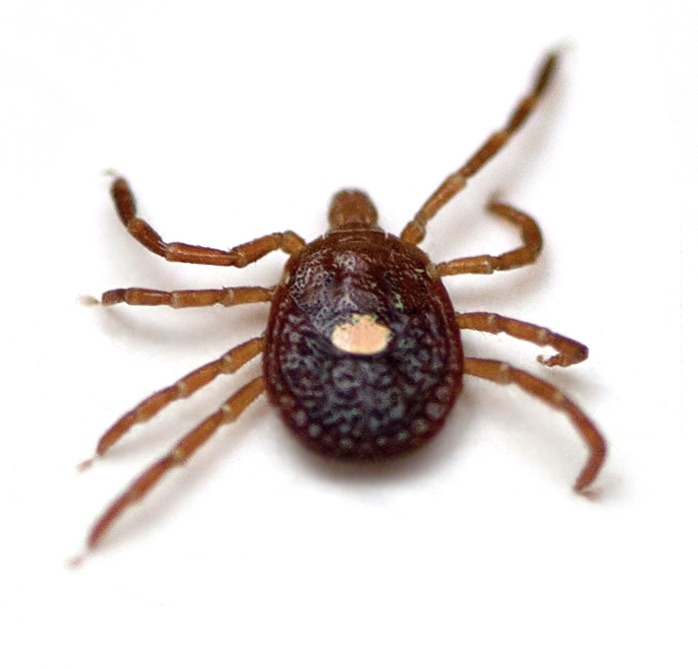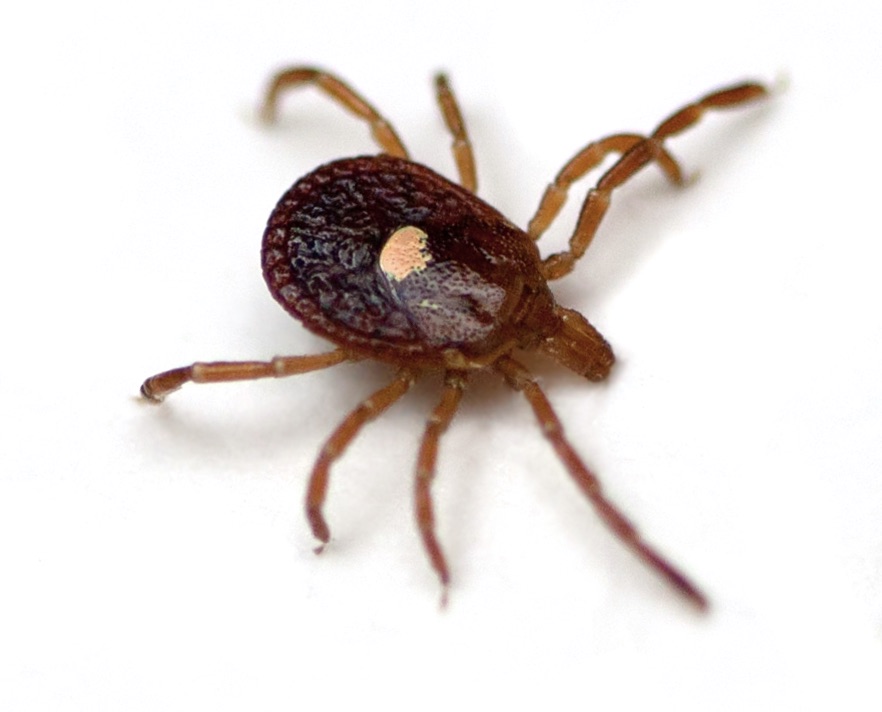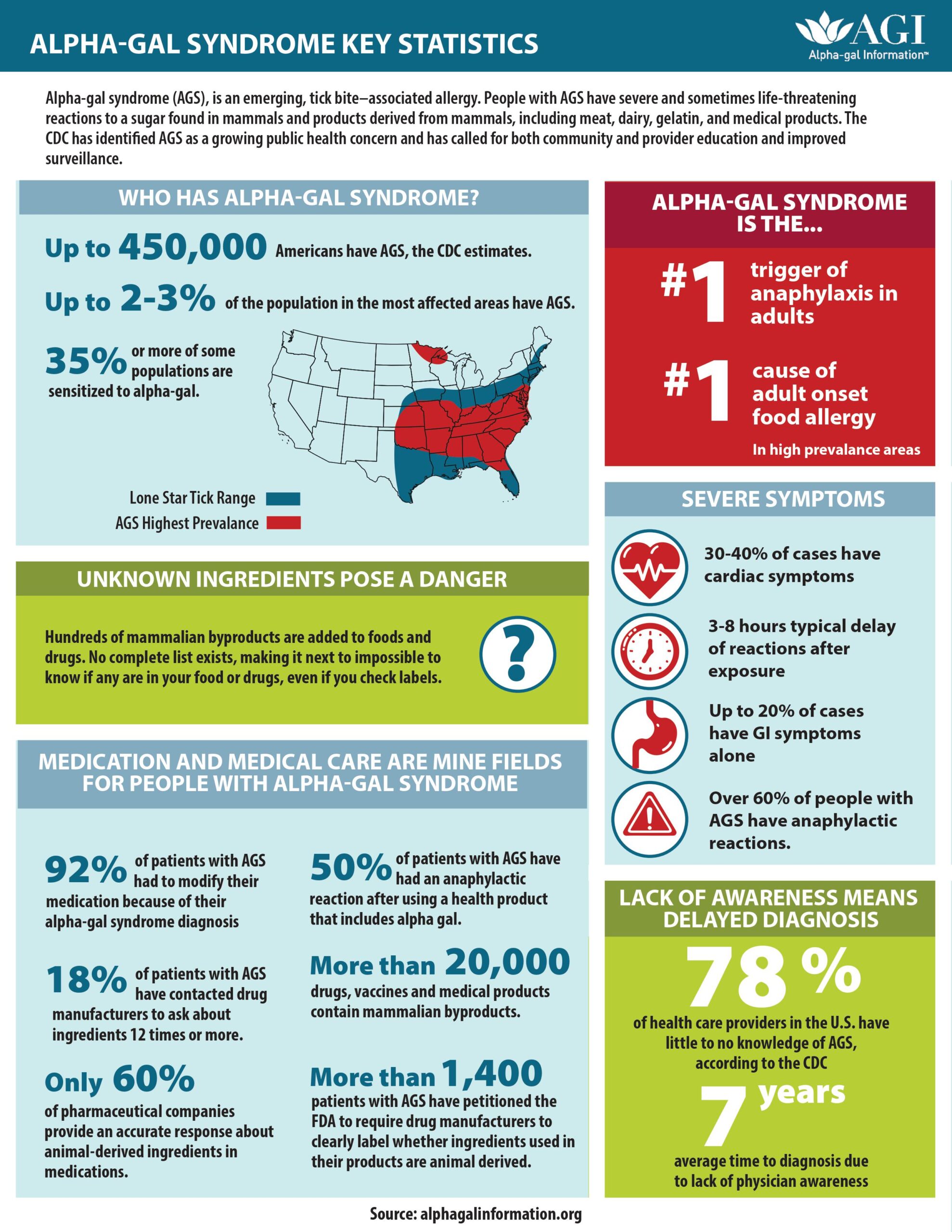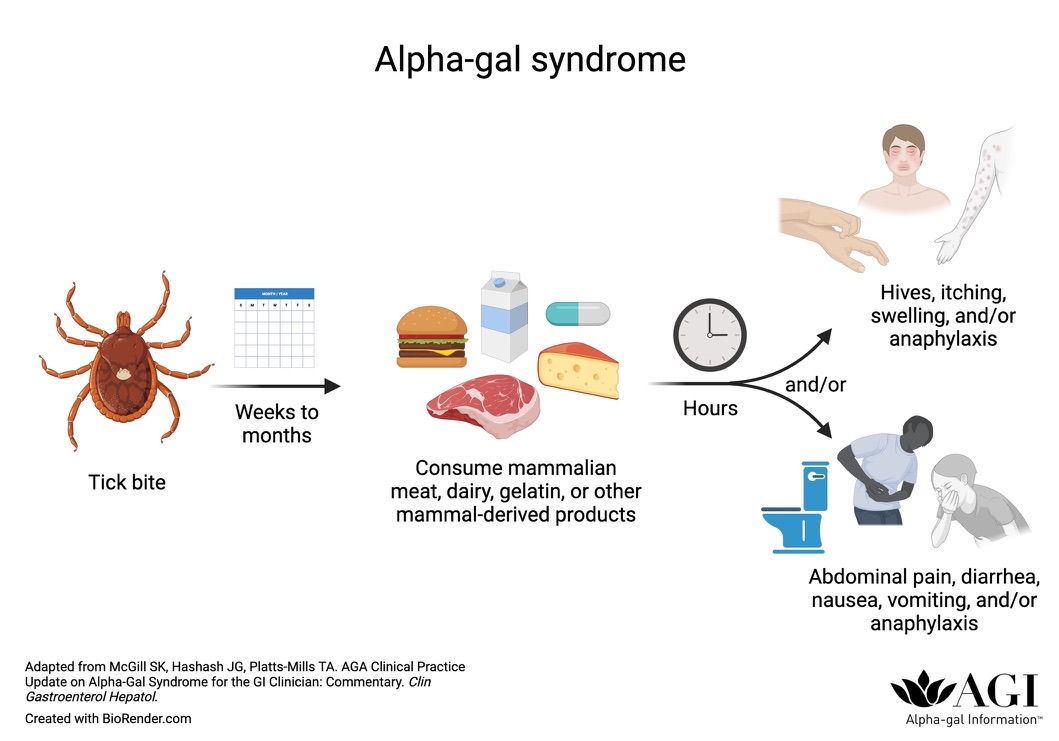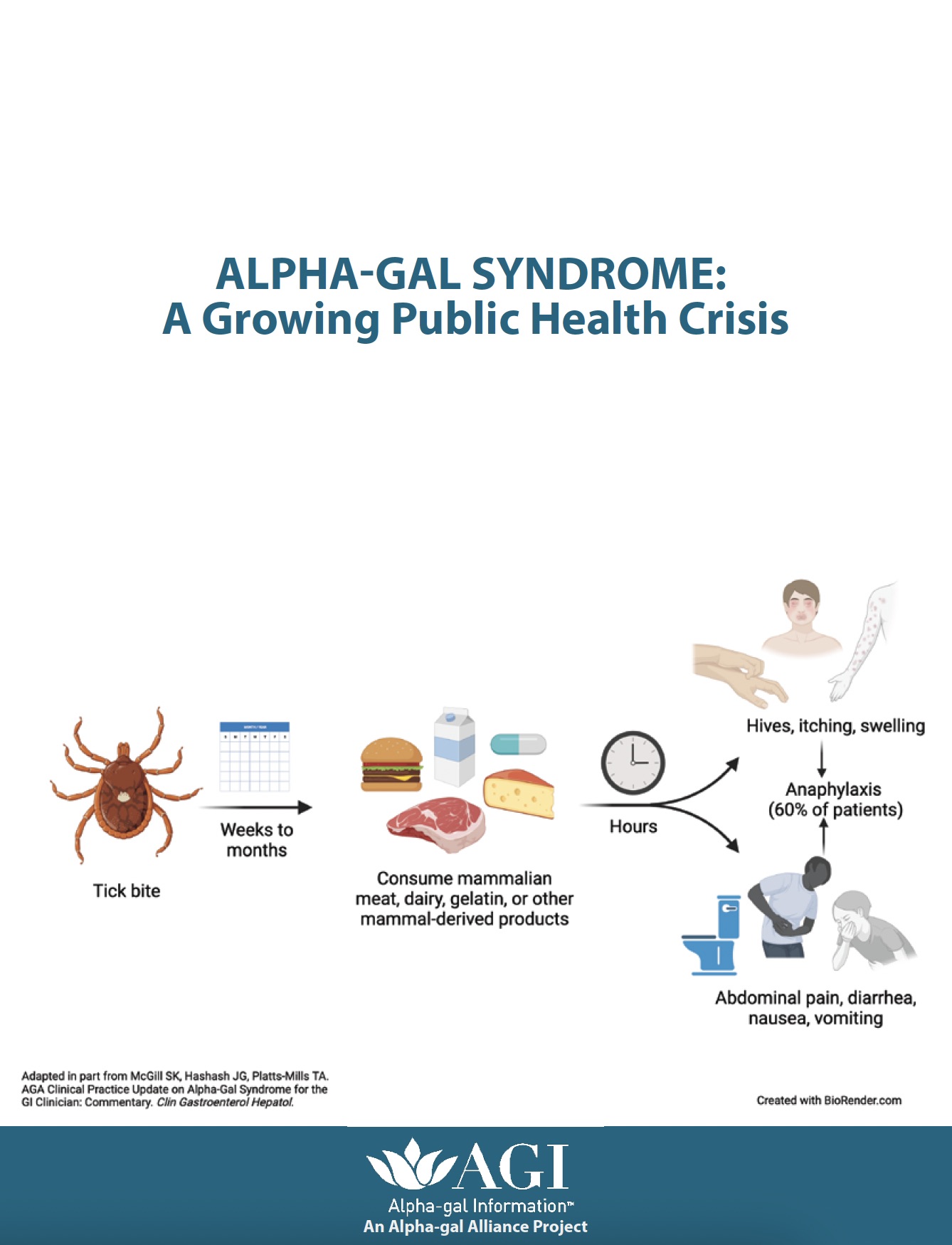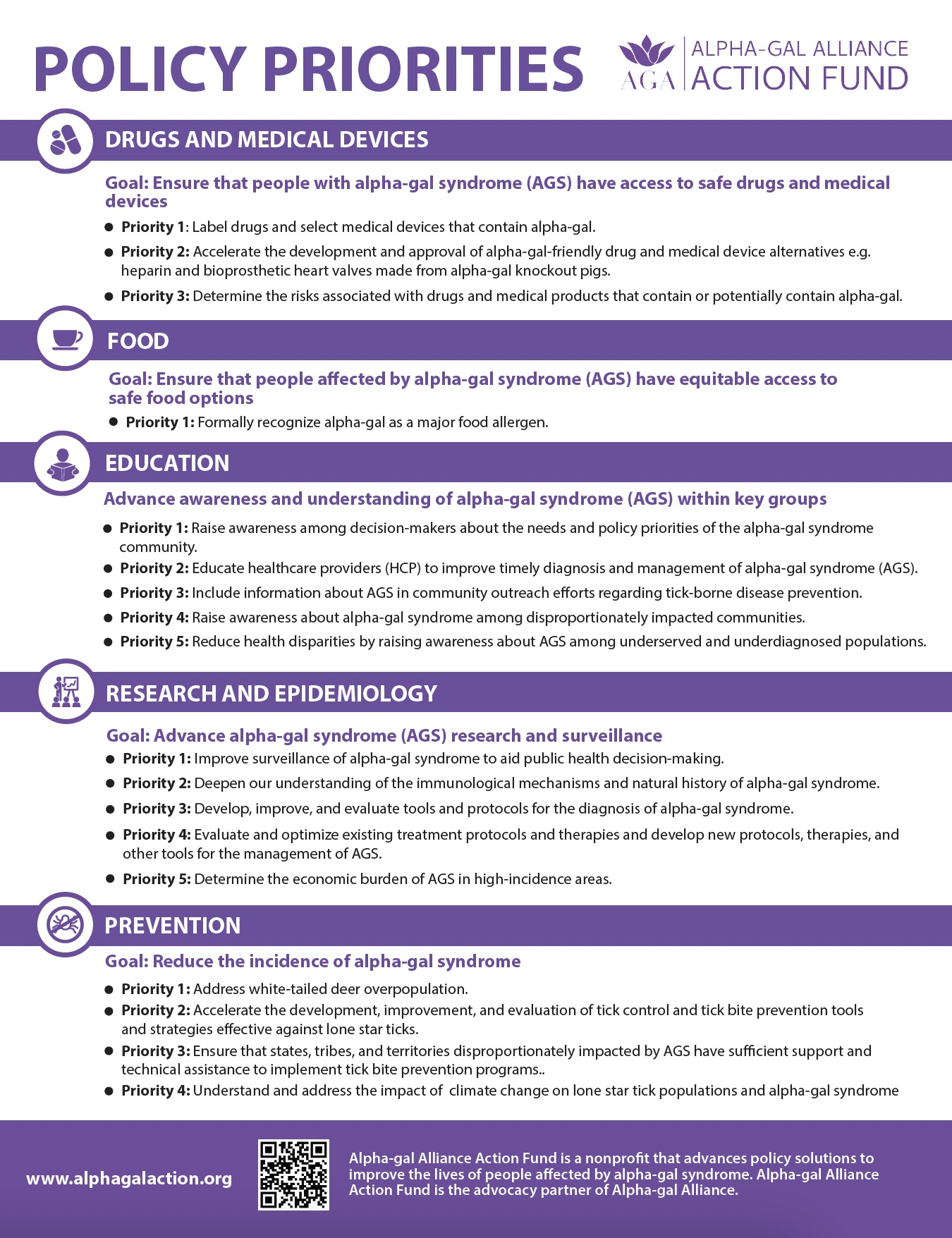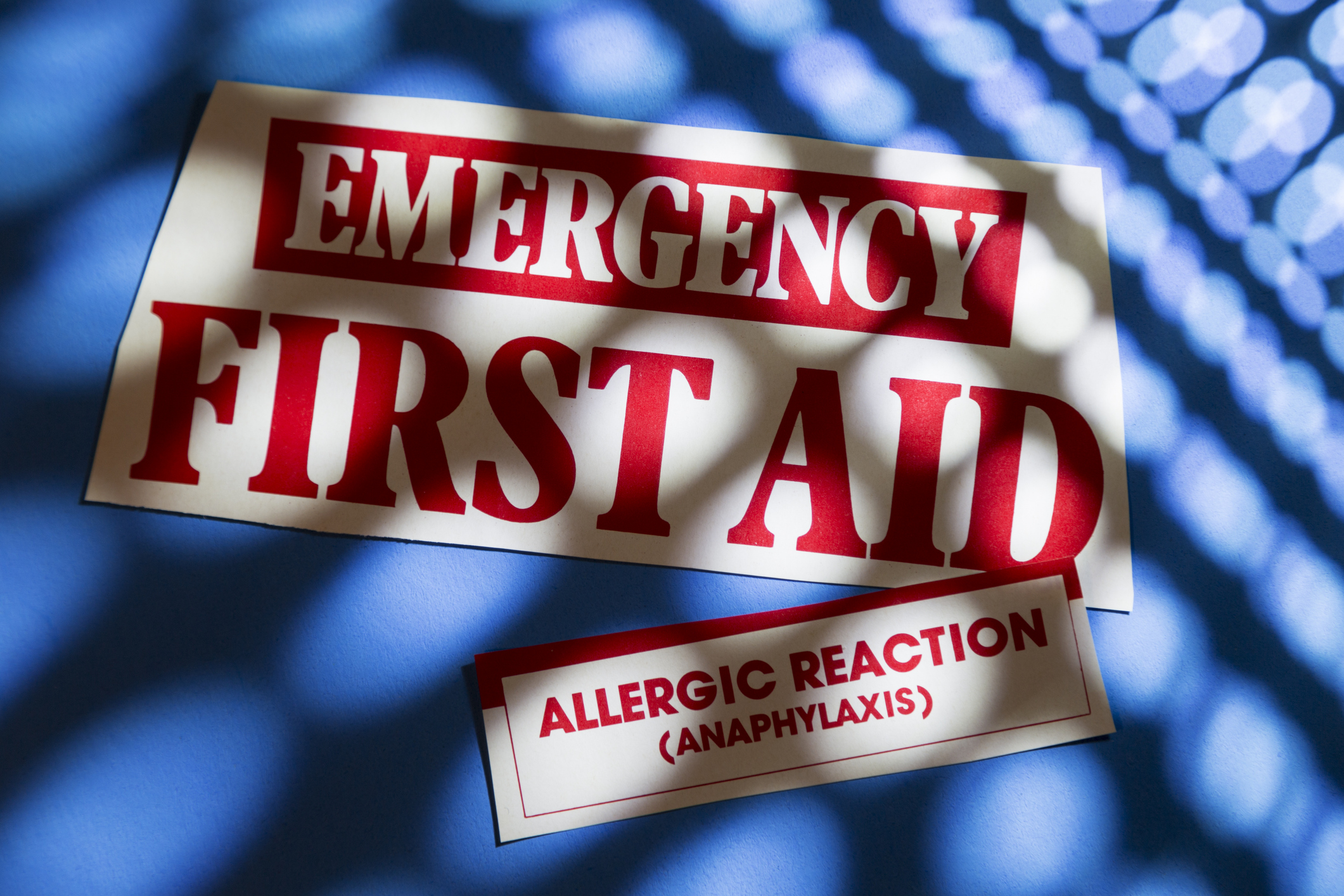ALPHA-GAL INFORMATION
A project of Alpha-gal Alliance
Alpha-gal Syndrome
The Epidemic You Never Heard of
Alpha-gal syndrome (AGS), or mammalian meat allergy, is a tick-induced allergy to galactose-α-1,3-galactose (1). This sugar, commonly known as alpha-gal, is found in all mammals except for humans and some primates (2).
Products made from mammals can also contain alpha-gal. These include mammalian meat (like beef, pork, and lamb), milk and dairy products, gelatin, medications, medical products (like heparin and vaccines), personal care products (like lotion and make-up), and many other items. (3)
Reactions, which can be life-threatening, may be immediate, as in the case of injected drugs, or delayed from 2 to 10 hours, as is typical after the consumption of mammalian meat (1).
The Alpha-gal Allergen
Inclusion Act
Act Now!
This new bill would add alpha-gal to the list of major food allergens. Alpha-gal is not listed on food labels. If the bill passes, disclosing alpha-gal on the label of most packaged foods will be required. This will help us identify safe foods.
If you are a U.S. citizen, please use this form to urge your member of the U.S. House of Representatives to cosponsor the Alpha-gal Allergen Inclusion Act.
While it is a growing epidemic, there is still lack of awareness about the alpha-gal syndrome leading to delay in diagnosis and misdiagnosis. This is a great website to explore more.
See Prof Iwasaki’s alpha-gal syndrome Twitter thread here.
NEWS
New CDC training module!

Access the CDC alpha-gal syndrome training module
Download training module flyer to share with your providers
New webinar recording!
New alpha-gal syndrome
quiz!
Alpha-gal Syndrome: Testing and Diagnosis
How well do you understand diagnosis of alpha-gal syndrome? Test your knowledge!
CDC reports shocking increase in cases and lack of physician awareness

450,000
Up to 450,000 Americans are now estimated to have alpha-gal syndrome.

10th Most Common Food Allergen
The CDC’s estimate makes alpha-gal syndrome the 10th most common food allergy in the U.S.

78%
78% of healthcare providers know little to nothing about alpha-gal syndrome.

Only 5%
Only 5% of healthcare providers feel very confident in diagnosing and managing alpha-gal syndrome.
New Resources
Click image to enlarge
Click here to download PDF
Find more information about policy priorities on the Alpha-gal Alliance Action Fund website.
Have you been bitten by a tick?
Do you get sick in the middle of the night after eating red meat?
Do you have unexplained anaphylactic reactions, hives, GI issues, or arthritis?
You may have alpha-gal syndrome.
What is Alpha-gal Syndrome?
Symptoms
Diagnosis and Testing
Expert Scott Commins Explains Alpha-gal Syndrome
Fast facts about alpha-gal syndrome
“In this unselected cohort from central Virginia, the prevalence of a-Gal sIgE was 15.1% but self-reported mammalian meat allergy was 2.2% (10).“
“In certain geographic areas and in populations with high tick exposure, the level of sensitization can be 15-35% but this does not represent clinical AGS, which appears to occur in 1-8% of sensitized individuals (3).”
“…in the southeastern United States, approximately 3% of the general population exhibits anaphylaxis after consumption of mammalian meat (6).”
“In geographic areas where tick bites are common, AGS is likely under- recognized and under-diagnosed. We suggest testing for alpha-gal IgE in tick-endemic areas as part of the evaluation for cases of idiopathic anaphylaxis, recurrent urticaria and/or angioedema, as well as recurrent, episodic gastrointestinal cramping of unestablished cause (3).”
*most of the southeastern U.S. and other populations with high tick exposure, including areas of the Midwest and much of the eastern U.S.
Hundreds
of mammalian byproducts with obscure names are added to foods and drugs. No complete list exists, making it next to impossible to know if any are in your food or drugs, even if you check labels.
More than 20,000
drugs, vaccines and medical products contain mammalian byproducts.
More than 1,400
patients with AGS have petitioned the FDA to require drug manufacturers to clearly label whether ingredients used in their products are animal derived .
Contact [email protected] with any questions. We would be happy to provide you with more information, including references.
THE GI VARIANT OF AGS
Did a tick bite cause your digestive issues?
Alpha-gal syndrome can cause GI issues without classic, allergic symptoms like hives.
Learn more from the American Gastroenterological Association.
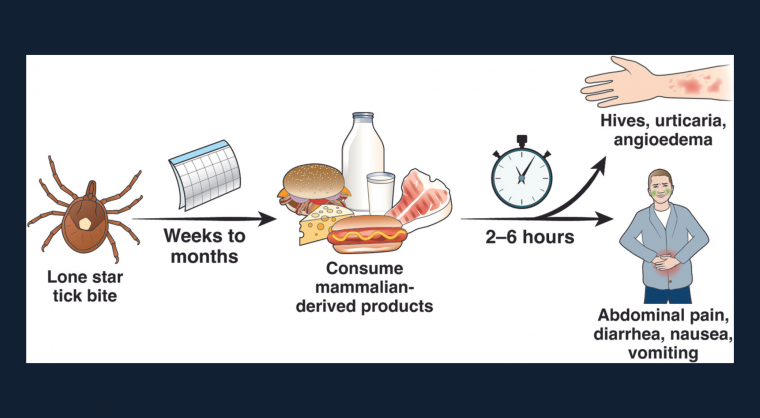
How to know if a tick bite caused your patients’ digestive problems
“The current paradigm is that GI doctors should rarely think about food allergies, because those are problems of kids, not adults, and symptoms in allergies should occur reproducibly after exposure. That’s just not true in alpha-gal allergy. Mostly this has been reported in adults, and the delay of hours from eating the meat to reaction means that almost no patient can actually link the two (21).”
Learn about the GI Variant of Alpha-gal Syndrome
Immunoglobulin E to alpha-gal may be an underrecognized but frequent cause of gastrointestinal tract symptoms in eastern North America in the habitat distribution of the Lone Star tick.
Isolated GI Alpha-Gal Meat Allergy: What Clinicians Need to Know
Sarah K. McGill, MD, MSc
ACOG Virtual Grand Rounds
August 19, 2021
Newly diagnosed? Start here!
What Do My Test Results Mean?
Management of Alpha-gal Syndrome
Alpha-gal Tolerance Levels
What Is Alpha-gal Found In?
Checklist for the Newly Diagnosed
Avoiding Additional Tick Bites
GET HELP
Make an Appointment with an Expert
Patient Recommended Physicians
Find a Support Group
Pill Clarity
Visit the Pill Clarity website to find animal-free medications
Download a Pill Clarity 4x6 card to share with providers and pharmacists
LEARN MORE
Where does alpha-gal syndrome occur?
Publications Database
Support Alpha-gal Syndrome Research
Alpha-gal syndrome was only discovered in 2009. Yet it is already the 10th most common allergy in the U.S. and growing exponentially on six continents.
There is much that needs to be done.
Why not by YOU?
Sign Up for Our Mailing List to Receive Updates
References
General Overview
Commins SP. Diagnosis & management of alpha-gal syndrome: lessons from 2,500 patients. Expert Rev Clin Immunol. 2020;16(7):667-677. <sup>tm</sup>
Platts-Mills TAE, Li RC, Keshavarz B, Smith AR, Wilson JM. Diagnosis and Management of Patients with the α-Gal Syndrome. J Allergy Clin Immunol Pract. 2020;8(1):15-23.e1.
Platts-Mills TAE, Commins SP, Biedermann T, et al. On the cause and consequences of IgE to galactose-α-1,3-galactose: A report from the National Institute of Allergy and Infectious Diseases Workshop on Understanding IgE-Mediated Mammalian Meat Allergy. J Allergy Clin Immunol. 2020;145(4):1061-1071.
Hilger C, Fischer J, Wölbing F, Biedermann T. Role and Mechanism of Galactose-Alpha-1,3-Galactose in the Elicitation of Delayed Anaphylactic Reactions to Red Meat. Curr Allergy Asthma Rep. 2019;19(1):3.
Other References
1. Commins SP, Satinover SM, Hosen J, et al. Delayed anaphylaxis, angioedema, or urticaria after consumption of red meat in patients with IgE antibodies specific for galactose-alpha-1,3-galactose. J Allergy Clin Immunol. 2009;123(2):426-433.
2. Galili U, Clark MR, Shohet SB, Buehler J, Macher BA. Evolutionary relationship between the natural anti-Gal antibody and the Gal alpha 1—-3Gal epitope in primates. Proc Natl Acad Sci U S A. 1987;84(5):1369-1373.
3. Commins SP. Diagnosis & management of alpha-gal syndrome: lessons from 2,500 patients. Expert Rev Clin Immunol. 2020;16(7):667-677.
4. Commins SP, James HR, Kelly LA, et al. The relevance of tick bites to the production of IgE antibodies to the mammalian oligosaccharide galactose-α-1,3-galactose. J Allergy Clin Immunol. 2011;127(5):1286-1293.e6.
5. van Nunen SA. Tick-induced allergies: mammalian meat allergy and tick anaphylaxis. Med J Aust. 2018;208(7):316-321.
6. Bianchi J, Walters A, Fitch ZW, Turek JW. Alpha-gal syndrome: Implications for cardiovascular disease. Global Cardiology Science and Practice. 2020;2019(3).
7. Richards NE, Richards RD Jr. Alpha-Gal Allergy as a Cause of Intestinal Symptoms in a Gastroenterology Community Practice. South Med J. 2021;114(3):169-173.
8. Pattanaik D, Lieberman P, Lieberman J, Pongdee T, Keene AT. The changing face of anaphylaxis in adults and adolescents. Ann Allergy Asthma Immunol. 2018;121(5):594-597.
9. Commins, SP. (2018). Retrieved from: More people developing red meat allergy from tick bites. CBS News
10. Richards N, Keshavarz B, Workman L, Patel J, Platts-Mills T, Wilson J. Prevalence of α-Gal IgE and Mammalian Meat Allergy in a COVID-19 Vaccine Employee Cohort. J Allergy Clin Immunol. 2022;149(2):AB207.
11. Binder AM, Commins SP, Altrich ML, et al. Diagnostic testing for galactose-alpha-1,3-galactose, United States, 2010 to 2018. Ann Allergy Asthma Immunol. 2021;126(4):411-416.e1.
12. Commins SP, James HR, Stevens W, et al. Delayed clinical and ex vivo response to mammalian meat in patients with IgE to galactose-alpha-1,3-galactose. J Allergy Clin Immunol. 2014;134(1):108-115.
13. Fischer J, Yazdi AS, Biedermann T. Clinical spectrum of α-Gal syndrome: from immediate-type to delayed immediate-type reactions to mammalian innards and meat. Allergo J. 2016;25:55-62.
14. van Nunen S. Galactose-Alpha-1,3-Galactose, Mammalian Meat and Anaphylaxis: A World-Wide Phenomenon? Current Treatment Options in Allergy. 2014;1(3):262-277.
15. van Nunen SA. Tick-induced allergies: mammalian meat allergy and tick anaphylaxis. Med J Aust. 2018;208(7):316-321.
16. Wilson JM, Schuyler AJ, Workman L, et al. Investigation into the α-Gal Syndrome: Characteristics of 261 Children and Adults Reporting Red Meat Allergy. J Allergy Clin Immunol Pract. 2019;7(7):2348-2358.e4.
17. McGintee, E. (2015). Retrieved from Meat Allergy Triggered by a Tick Bite with Erin McGintee, MD. Southampton Hospital’s Tick-Borne Disease Resource Center Symposium for Medical Professionals.
18. Mabelane T, Basera W, Botha M, Thomas HF, Ramjith J, Levin ME. Predictive values of alpha-gal IgE levels and alpha-gal IgE: Total IgE ratio and oral food challenge-proven meat allergy in a population with a high prevalence of reported red meat allergy. Pediatr Allergy Immunol. 2018;29(8):841-849.
19. Platts-Mills TAE, Li RC, Keshavarz B, Smith AR, Wilson JM. Diagnosis and Management of Patients with the α-Gal Syndrome. J Allergy Clin Immunol Pract. 2020;8(1):15-23.e1.
20. Flaherty MG, Kaplan SJ, Jerath MR. Diagnosis of Life-Threatening Alpha-Gal Food Allergy Appears to Be Patient Driven. J Prim Care Community Health. 2017;8(4):345-348.
21. Look Out for Alpha-Gal Syndrome in Unexplained GI Symptoms, Says AGA: New guidance informs providers on the syndrome’s related digestive problems. Gastroenterology and Endoscopy News. Mar 24, 2023.
22. Thompson JM, Carpenter A, Kersh GJ, Wachs T, Commins SP, Salzer JS. Geographic distribution of suspected alpha-gal syndrome cases – United States, January 2017-December 2022. MMWR Morb Mortal Wkly Rep. 2023;72(30):815-820.
23. Carpenter A, Drexler NA, McCormick DW, et al. Health care provider knowledge regarding alpha-gal syndrome – United States, march-may 2022. MMWR Morb Mortal Wkly Rep. 2023;72(30):809-814.
24. Uchi J, et al. Understanding health related challenges in patients with alpha-gal syndrome. Presented at: DIA Annual Global Meeting; June 25-29, 2023; Boston.
25. Ailsworth SM, Susi A, Workman LJ, et al. Alpha-gal IgE Prevalence Patterns in the United States: An Investigation of 3000 Military Recruits. J Allergy Clin Immunol Pract. Published online October 31, 2023. doi:10.1016/j.jaip.2023.10.046
All the information on alphagalinformation.org is provided in good faith, but we, the creators and authors of the Alpha-gal Information website offer no representation or warranty, explicit or implied, of the accuracy, adequacy, validity, reliability, availability, or completeness of any information on this site. Under no circumstances should we have any liability for any loss or damage incurred by you as a result of relying on information provided here. We are not physicians or medical professionals, researchers, or experts of any kind. Information provided in this website may contain errors and should be confirmed by a physician. Information provided here is not medical advice. It should not be relied upon for decisions about diagnosis, treatment, diet, food choice, nutrition, or any other health or medical decisions. For advice about health or medical decisions including, but not limited to, diagnosis, treatment, diet, and health care consult a physician.
READ FULL DISCLAIMER>

